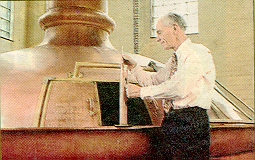 "The regional breweries, by virtue of scale, location, technology and the forces of history are condemned.
They’re not going to make it." So says Paul Shipman, president of Redhook Brewing. Maybe so, but don’t
tell the regional breweries. In drab buildings in drab smokestack towns, using aging equipment
and (sometimes) adjuncts, they’re too busy succeeding.
"The regional breweries, by virtue of scale, location, technology and the forces of history are condemned.
They’re not going to make it." So says Paul Shipman, president of Redhook Brewing. Maybe so, but don’t
tell the regional breweries. In drab buildings in drab smokestack towns, using aging equipment
and (sometimes) adjuncts, they’re too busy succeeding.There are around 20 of these rugged survivors, some independent, some in joint ownership with larger brewers, and some wholly owned subsidiaries which operate semi-independently. They range in size from Genesee’s 2,000,000 bbls/year to Staub’s micro-sized 30,000 bbls/year.
The wide range of beer they brew is surprising. The rankest , adjunct-heavy swill may come from the same tanks as all-malt, aggressively hopped GABF medal winners. Pittsburgh Brewing, brewers of the (unfairly) despised Iron City, also brews over half the Samuel Adams Lager sold.
Anchor is a regional brewery which early on took the path of craft brewing, and others seem determined to follow in their footsteps. The story of these breweries is being overlooked in the exciting success of the Micro Revolution. Here are four Tales of different paths to rebirth, four regional brewers who are surfing the new wave of beer awareness.
In 1829, a young German immigrant named David Yuengling bucked the national preference for ale and started a lager brewery in Pottsville, PA. One hundred sixty-five years later, in a market dominated by mass brewers of bland pseudo-pilsners and aggressive upstart microbrewers, D. G. Yuengling & Son still makes beer the way they want to, up on the hill in Pottsville, America’s oldest continually operating brewery.
Dick Yuengling’s son, Dick Jr. bought the brewery in 1985 when it looked like Yuengling might be headed for the scrapheap after all. Determined not to be "The Last Yuengling," Dick worked with Brewmaster Ray Norbert to develop Yuengling Traditional Lager, a specialty-malt transition beer. The brewery also started a new stylistic niche. Local drinkers often mixed the Pottsville Porter with Yuengling’s lighter beers. When the brewery got a request from Reading’s Northeast Taproom for a premixed draft "half ‘n’ half," they happily complied. Other tavern owners asked for it, and it became the Black and Tan.
They pitched the beer to upscale spots in Philadelphia using the brewery’s history and regional appeal. Yuengling Black and Tan became the beer that made Philly unafraid of the dark. Suddenly, Yuengling was selling ahead of production, a predicament which has persisted for the last three years. The brewery was running seven days a week at about 150% of capacity. Ray Norbert waves that figure aside. "We had figured capacity at 170,000 bbls, but you never really know what your capacity is until you need it."
This Remains true despite the brewery’s recent expansion project, which boosted capacity by 50 percent. An aging and cooling facility, all stainless steel and white epoxy, it is a far cry from the brewery’s decades-old equipment, rattling, roaring bottling lines, and original lagering tunnels, still used for keg storage. But it’s not enough. Fans of "Vitamin Y" recently learned that Yuengling is planning to build a large new brewery. "We’re considering upwards of 7500,000 bbl. capacity," said Marketing Director David Casinelli. "Probably closer to a million. [Yuengling’s home area] Schuylkill County is still in the lead for the site, but we have other sites under consideration."